Muslims

Larycia Hawkins, who left Wheaton College in the wake of controversy over her statement that Christians and Muslims worship one God, has a new gig: a fellowship named for a Muslim military hero.
The University of Virginia announced March 3 that she will join its Institute for Advanced Studies in Culture as the “Abd el-Kader Visiting Faculty Fellow,” named for a 19th-century Algerian leader who was committed to intercultural dialogue.
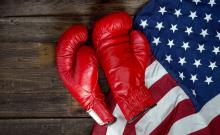
There is a big difference between criticism/critique and accusation. We all use criticism all the time: when we read the ingredients on a product we buy in the store, when we purchase clothing and make sure it doesn’t have flaws, when we disagree (politely) with one another. Criticism is not scapegoating. This distinction is where people get confused. They say ‘you are criticizing so and so and scapegoating them.’ This is incorrect.
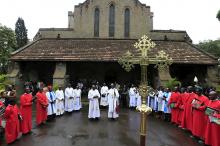
A Muslim man who shielded Christians after a passenger bus was ambushed by suspected al-Shabab militants is being saluted as a symbol of unity. Salah Farah, a schoolteacher, died Jan.18 in Nairobi, where he was airlifted after being shot in the arm and hip when he resisted militant demands that he identify Christians on the bus during the December attack.
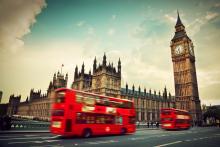
Britain’s Parliament held a boisterous debate Jan. 18 on a proposal to ban Donald Trump from the country in a rebuke of his call to block Muslims from entering the United States. The topic drew plenty of support from the British lawmakers, who don’t actually have the power ban anyone. The debate did allow members of Parliament to vent their frustrations about Trump’s comments.
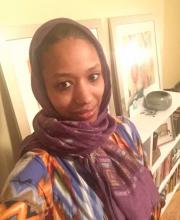
Wheaton College suspended Larycia Hawkins, professor of political science, on Dec. 15 after she said Christians and Muslims "worship the same God." Hawkins' primary purpose was to announce that she would wear hijab during Advent to show her solidarity with Muslims in the United States facing persecution.
Now, according to a statement released Jan. 5, Wheaton Provost Stanton Jones delivered to President Philip Ryken a "Notice of Recommendation to Initiate Termination-for-Cause Proceedings regarding Dr. Hawkins."
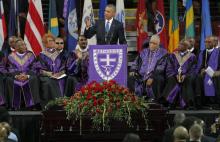
Religion inspired countless other acts of forgiveness, mercy, and hope this year. But religion — or perversions of it, some would say — also inspired horrific violence: the “faith-based” cleansing of ancient lands, and bombings and shootings motivated by scriptural justifications. It was a year also of religious-inspired activism, seen perhaps most prominently in a pope who advocated for the poor and for a solution to climate change. Here is an overview of some of the most consequential religion stories of the past year, with thoughts on what to look forward to 2016.

Christian leaders have hailed as an act of bravery and selflessness the shielding of some Christians by Muslims after suspected al-Shabab gunmen in Mandera County ambushed a passenger bus.
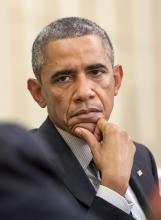
President Obama supports the right of Muslim Americans to celebrate religious holidays, the White House said Dec. 11. He just can’t give them the day off.
Responding to a petition on the White House’s “We the People” site, the White House declined to declare federal holidays for the Muslim holy days of Eid al-Adha and Eid al-Fitr.
That’s because Congress has only designated 10 federal holidays each year: New Year’s Day, Martin Luther King, Jr. Day, Washington’s Birthday, Memorial Day, Independence Day, Labor Day, Columbus Day, Veterans Day, Thanksgiving, and Christmas.
“Proposals for new permanent federal holidays are typically the province of Congress,” the White House said.
This week's Wrap was guest curated by Sojourners contributor Adam Ericksen. Read along for his top stories and notes from the week!
There was a lot of negativity in the news this week, but mercy also filled the airwaves. In case you missed it, here’s a list of some merciful events from the week:
1. Pope Francis Opens the Door to ‘Year of Mercy’ in a Time of Fear
Sure, we have some differences, but we’re still crushing on the Pope. “To pass through the holy door means to rediscover the infinite mercy of the Father who welcomes everyone and goes out personally to encounter each of them.”

Hate crimes in America dipped across the board in 2014, except in the category of anti-Muslim crimes, which rose about 14 percent over the prior year. Given the barbaric Islamic State attacks in Paris last week and elsewhere recently, that latter trend seems destined to accelerate.
The presence of hate crimes against Muslims is no new phenomenon. Prior to the 9/11 attacks, there typically recorded between 20-30 hate crime against Muslims per year and after 2001 that number rose to nearly 500.
This summer, we saw the murder of three Muslim students in Chapel Hill, N.C. On Nov. 15 in London, a man pushed a Muslim woman into an oncoming underground train. And on Thanksgiving Day, a man in a taxicab in Pittsburgh, Pa., shot his driver in the back for being Muslim.
These incidents do not need to be listed as statistics to validate reality but they do need to be heard.
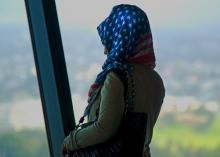
If our nation is to remember the lives of all who have suffered because of 9/11, Christians will need to do their part to renegotiate the terms for who and what we remember. Otherwise, “never forget” will remain a well-intended but shallow slogan that encourages us to elevate some lives above others, and to turn a blind eye to the violence, injustice, and hatred directed at Muslims in our name.
If our nation is to remember the lives of all who have suffered because of 9/11, Christians will need to do their part to renegotiate the terms for who and what we remember. Otherwise, “never forget” will remain a well-intended but shallow slogan that encourages us to elevate some lives above others, and to turn a blind eye to the violence, injustice, and hatred directed at Muslims in our name.
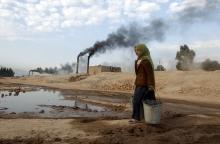
Supporters of the Islamic Declaration on Climate Change included the grand muftis (highest authorities in religious law) of Uganda and Lebanon and government representatives from Turkey and Morocco. The conference itself, the International Islamic Climate Change Symposium, was co-sponsored by Islamic Relief Worldwide, the Islamic Foundation for Ecology and Environmental Sciences, and GreenFaith.
The declaration comes at a moment ripe for climate change discussion, in the wake of President Obama’s announcement of a Clean Power Plan on Aug. 3. The plan requires states to reduce carbon emissions from coal power plants starting in 2017. It’s also a timely precursor to the upcoming United Nations Conference on Climate Change in Paris this December.
The declaration cites climate change research, followed by a detailed call to action. Among other things, it puts pressure on those attending the United Nations Conference on Climate Change to set clear goals, calls on wealthy and oil-producing nations to be leaders in curbing greenhouse gas emissions by 2050, and asks that all nations commit to 100 percent renewable energy or a zero emissions strategy.

To celebrate their 50th birthdays, Mara Gubuan and her Urbandale, Iowa, high school classmates invited six elite Muslim female athletes to RAGBRAI, the annual bicycle ride that took place July 19-25 across the Hawkeye State.
The idea was to “create a counter-narrative” to dispel the misconception that Muslim women don’t compete in sports. The riders of Team Shirzanan, from mostly Muslim countries, showed it could be done, even while wearing headscarves during July’s summer heat.
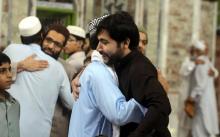
What followed after two gunmen were killed trying to carry out an attack on an anti-Muslim “Draw Muhammad Contest” was predictable.
Pamela Geller, the organizer of the event, called for war, American Muslims condemned the attack, and the mainstream media rehashed the very old and exhausting debate about whether Islam has a violence problem.
This routine unfortunately reeks of collective responsibility, an antithesis to sound moral ethics in all societies, including Western ones.
1. Drone Strikes Reveal Uncomfortable Truth: U.S. Is Often Unsure About Who Will Die
Following the president’s admission this week that two Western hostages were killed in a drone strike in Pakistan, protestations against the veiled drone program have re-escalated. “Every independent investigation of the strikes has found far more civilian casualties than administration officials admit. Gradually, it has become clear that when operators in Nevada fire missiles into remote tribal territories on the other side of the world, they often do not know who they are killing, but are making an imperfect best guess.
2. Infertility and the Role of the Church
This week is Infertility Awareness Week. Writer Rachel Marie Stone dives into some of the attitudes about infertility and reproductive technologies in the church.
3. Meet Your New Attorney General
After postponing a vote for more than five months to fight along party lines over abortion language in a human trafficking bill, the Senate voted Thursday to approve the nomination of Loretta Lynch, 55, making her the first black woman to head up the Justice Department.
4. Those Countries at the Top of the World Happiness Report Also Have Great Press Freedom Rankings
See what country falls where and read more about the correlation.

Radical Muslims. The phrase elicits images of ISIS militants and terror in the desert, perhaps grainy YouTube videos, Kalashnikovs, and raised fists.
What about a man in an ankle-length garment and cotton headscarf carving the air with his skateboard?
Is that a radical Muslim?
Along with shirts bearing the “Radical Muslims” image and a Nike-like swoosh saying “Just Dua It” (dua being nonobligatory Muslim prayer, or supplications), Boston-based Munir Hassan has created an entire line of stereotype-shattering clothing for American Muslims.
In an explicit attempt to flip the script on popular images of Muslims and Islamic symbols, Hassan’s own Sidikii Clothing Co. merges cultures in fashion-forward, Muslim inspired designs.
“I’m Muslim, I’m American. I was born both,” said Hassan.
“I wanted to design clothing that showcased different pieces of my culture inclusively.”
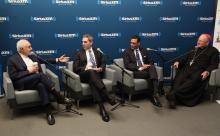
Is religion the cause of so much of the violence racking today’s world? Or is faith just one of many factors? Or collateral damage?
Those are tough questions, the kind that are usually posed to religious leaders, not by religious leaders.
But Cardinal Timothy Dolan wanted to switch things up on his weekly radio show, so he invited a minister, a rabbi, and an imam to tackle that issue. What sounds like the opening line of a joke was actually an in-depth discussion of “the rise of religious intolerance.”
“I don’t know if there would be anything more pertinent today, or more timely today, than religious harmony, or the lack thereof,” Dolan, the Roman Catholic archbishop of New York, said March 31 in opening a special edition of his program on the Catholic Channel of the SiriusXM network.
“The elephant in the room is that today, whether we like it or not, religion is often the cause of scandal,” he said.
“Religion is supposed to be an overwhelmingly positive force that brings people together, that increases love and understanding, human progress and human enlightenment.”
But many people today — believers and nonbelievers alike — see religion as the opposite, he said, and “that keeps the four of us up at night.”
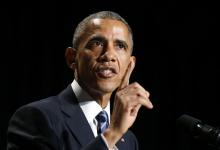
After taking heat from the religious right for saying Christians and Muslims have all committed horrors in God’s name, President Obama is now angering the religious left with an upcoming White House conference on combating ”violent extremism” that seems to focus only on Muslims.
The back-to-back controversies raise the question: Can Obama — or any president — safely discuss faith in today’s political crosswinds?
No, say experts who keep a close eye on presidential God talk. It’s a perilous walk, taken without a safety net as news and social media voices wait to savage him in a nanosecond.
Obama’s remarks at the National Prayer Breakfast triggered fury when Obama mentioned the Crusades, the Inquisition and Jim Crow segregation laws as examples of Christian violence in God’s name.
“This is not unique to one group or one religion,” Obama said. “There is a tendency in us, a sinful tendency that can pervert and distort our faith.”
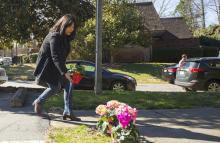
Preliminary police reports describe a long-simmering dispute over parking as the motive for the killings of three Muslim students at a Chapel Hill condominium Feb. 10.
But many Muslims in the Raleigh-Durham community and beyond are not so sure. The triple murders in this usually harmonious university town immediately took on a larger narrative of hate crimes against Muslims and charges of atheists baiting Muslims.
On Wednesday, police charged Craig Stephen Hicks, 46, of Chapel Hill with three counts of first-degree murder.
They allege he shot Deah Shaddy Barakat, 23, and his wife, Yusor Mohammad Abu-Salha, 21, and Abu-Salha’s sister, Razan Mohammad Abu-Salha, 19, of Raleigh inside their condominium near the University of North Carolina campus in Chapel Hill.

As American Sniper continues raking in money at the box office, the American-Arab Anti-Discrimination Committee remains worried about “serious threats” being made to Arabs and Muslims.
On Jan. 27, Warner Bros. issued a statement saying the movie studio “denounces any violent, anti-Muslim rhetoric, including that which has been attributed to viewers of American Sniper. Hate and bigotry have no place in the important dialogue that this picture has generated about the veteran experience.”
Director Clint Eastwood and Bradley Cooper, who plays real-life sniper Chris Kyle, have yet to comment, though over the weekend Eastwood called Sniper an anti-war film.
The film is based on Kyle’s memoir. He was shot to death in 2013 in the U.S. In the book, Kyle writes of killing 60 Iraqi “savages” during his four deployments: “Savage, despicable evil. That’s what we were fighting in Iraq.”
Since the film opened, tweets have echoed the sentiment, referring to “ragheads,” “vermin scum” and hatred of Muslims.